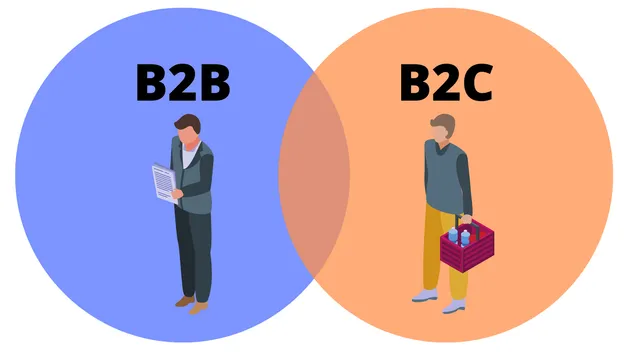Explore the essential differences between B2B (Business-to-Business) and B2C (Business-to-Consumer) marketing, from target audience and decision-making processes to content strategies and communication channels. Discover the unique benefits of each approach, whether you’re aiming to build long-term relationships with other businesses or connect emotionally with individual consumers. This guide provides insights to help you tailor your marketing strategy for maximum impact. Understanding B2B vs. B2C Marketing.
Key Differences:
- Target Audience:
- B2B (Business-to-Business): Targets other businesses, organizations, or professionals. The decision-making process typically involves multiple stakeholders and focuses on logic, ROI, and efficiency.
- B2C (Business-to-Consumer): Targets individual consumers. The decision-making process is often quicker and driven by emotions, personal needs, and desires.
- Decision-Making Process:
- B2B: Involves a longer sales cycle with multiple stages, including research, comparison, negotiation, and approval by different departments. Purchases are usually high-value and require thorough consideration.
- B2C: Generally involves a shorter sales cycle with fewer decision-makers. Purchases can range from low to high value but are often based on impulse, brand loyalty, or immediate need.
- Marketing Content:
- B2B: Focuses on in-depth, educational content like white papers, case studies, webinars, and detailed product information. The goal is to demonstrate value, expertise, and ROI.
- B2C: Emphasizes engaging, emotional, and entertaining content like social media posts, video ads, and product descriptions. The aim is to attract attention, create desire, and encourage quick purchase decisions.
- Communication Channels:
- B2B: Often uses LinkedIn, industry events, email newsletters, and direct sales. Relationships and networking are crucial.
- B2C: Leverages social media platforms, TV ads, influencer marketing, and retail channels. Mass communication and broad reach are key.
- Brand Messaging:
- B2B: Emphasizes value propositions, efficiency, and return on investment (ROI). Messaging is more formal and focused on solving business problems.
- B2C: Highlights benefits, convenience, and personal enjoyment. Messaging is more casual and aims to resonate on an emotional level.
Benefits:
- B2B Marketing Benefits:
- Higher Transaction Value: B2B transactions are often higher in value, leading to larger contracts and long-term relationships.
- Long-Term Relationships: B2B marketing fosters ongoing relationships, leading to repeat business and customer loyalty.
- Expertise and Authority: Effective B2B marketing establishes a brand as an industry leader, helping to build trust and credibility.
- Niche Targeting: B2B allows for precise targeting of specific industries or roles, resulting in more effective and personalized marketing efforts.
- B2C Marketing Benefits:
- Broader Audience: B2C marketing targets a larger audience, providing more opportunities for sales and brand recognition.
- Emotional Connection: B2C marketing often taps into emotions, creating a strong bond between the brand and the consumer.
- Quick Sales Cycle: The shorter decision-making process in B2C leads to faster sales and quicker ROI.
- Brand Loyalty: B2C brands can build strong loyalty through consistent, engaging, and relatable marketing, leading to repeat purchases and word-of-mouth referrals.
Conclusion:
Understanding B2B vs B2C marketing is crucial for developing effective strategies tailored to your target audience. While B2B focuses on long-term relationships, logical decision-making, and high-value transactions, B2C emphasizes emotional connections, quick sales, and mass appeal. Both have distinct advantages that can be leveraged to achieve your business goals.
